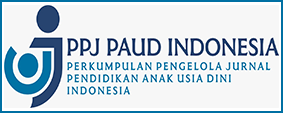
Author
Delvianti Basri(1
Pendidikan Anak Usia Dini, Universitas Negeri Padang, Indonesia(1)
Pendidikan Anak Usia Dini, Universitas Negeri Padang, Indonesia(2)
| Article Analytic |
Published : 2023-02-08
Article can trace at:
 Article Metrics
Article Metrics
Abstract Views: 1563 times
PDF Downloaded: 660 times
Abstract
Profesionalisme ditentukan sebagai kompetensi yang memenuhi standar pendidikan profesi sehingga guru dituntut untuk memiliki latar belakang profesi yang mumpuni dan memperoleh konsekuensi sebagai prinsip profesionalitas. Artikel ini bertujuan untuk memperoleh informasi mengenai tantangan dan strategi yang dihadapi oleh guru prasekolah untuk mengembangkan profesionalisme. Pendekatan penelitian yang digunakan adalah kajian pustaka. Data berupa artikel diperoleh dari google.co.id, researchgate.net dan Perpustakaan Nasional dengan kriteria hasil yang diperoleh mendukung topik penelitian. Pendekatan tema digunakan untuk melakukan proses analisis data. Hasil analisis data pada masing-masing variabel memunculkan tema yang beragam. Untuk tantangan pengembangan profesionalisme guru ditemukan tiga tema yakni keterbatasan waktu, keterbatasan dana, dan pelatihan yang tidak sesuai kebutuhan. Sementara itu, untuk strategi pengembangan profesionalisme guru terdapat empat tema yang mendukung. Implikasi hasil penelitian ini dapat menjadi rujukan dan dasar pengambilan keputusan pemerintah terutama untuk perkembangan pendidikan anak usia dini
Keywords
References
Afrianto Daud. (2018). Being a professional teacher in the era of industrial revolution 4.0: opportunities, challenges and strategies for innovative classroom practices. English Language Teaching and Research, 2(1), 1–14. http://ejournal.unp.ac.id/index.php/eltar/article/view/102675
al-Bakri, S., & Troudi, S. (2017). EFL teachers’ beliefs about professionalism and professional development: A case study from Oman. Journal of Applied Linguistics and Professional Practice, 15(1), 1–23. https://doi.org/10.1558/jalpp.34885
Alabi, A. T., & Ijaiya, N. Y. S. (2014). Funding strategies and sustenance of ECE in Nigeria: The way forward. European Scientific Journal2, 8(1), 12–21.
Darling-hammond, L., Hyler, M. E., & Gardner, M. (2017). Effective Teacher Professional Development. RESEARCH BRIEF, April, 1–8. https://doi.org/10.54300/122.311
Deniz, Ü. (2022). What Should We Understand From Teachers ’ Professional Identity ? An What should we understand from teachers ’ professional identity ? An overview of the literature. Journal of Innovative Research in Teacher Education, 3(1), 113–127. https://doi.org/10.29329/jirte.2022.464.4
Erdoğan, S., Haktanır, G., Kuru, N., Parpucu, N., & Tüylü, D. K. (2022). The effect of the e-mentoring-based education program on professional development of preschool teachers. In Education and Information Technologies (Vol. 27, Issue 1). https://doi.org/10.1007/s10639-021-10623-y
Hargreaves, A., Boyle, A., & Harris, A. (2014). Uplifting leadership: How organizations, teams, and communities raise performance. Jossey-Bass.
Hargreaves, A., & O’Connor, M. T. (2018). Collaborative professionalism: When teaching together means learning for all. Corwin Press.
Ita, E. (2020). Pengembangan Profesionalitas Guru Pendidikan Anak Usia Dini (Studi Pada Taman Kanak-Kanak Ade Irma Mataloko Kabupaten Ngada). Jurnal Ilmiah Pendidikan Citra Bakti, 7(1), 62–74. https://doi.org/10.38048/jipcb.v7i1.66
Jeon, L., Buettner, C. K., & Hur, E. (2016). Preschool Teachers’ Professional Background, Process Quality, and Job Attitudes: a Person-Centered Approach. Early Education and Development, 27(4), 551–571. https://doi.org/10.1080/10409289.2016.1099354
Kholis, N. (2019). Teacher Professionalism in Indonesia, Malaysia, and New Zealand. TARBIYA: Journal of Education in Muslim Society, 6(2), 179–196. https://doi.org/10.15408/tjems.v6i2.11487
Lang, S. N., Mouzourou, C., Jeon, L., Buettner, C. K., & Hur, E. (2017). Preschool Teachers’ Professional Training, Observational Feedback, Child-Centered Beliefs and Motivation: Direct and Indirect Associations with Social and Emotional Responsiveness. Child and Youth Care Forum, 46(1), 69–90. https://doi.org/10.1007/s10566-016-9369-7
Múñez, D., Bautista, A., Khiu, E., Keh, J. S., & Bull, R. (2017). Preschool teachers’ engagement in professional development: Frequency, perceived usefulness, & relationship with self-efficacy beliefs. Psychology, Society and Education, 9(2), 181–199. https://doi.org/10.25115/psye.v9i2.655
Nababan, T. M., Purba, S., & Siburian, P. (2020). The Challenge of Being a Teacher in Industrial Revolution 4.0. Proceedings of the 5th Annual International Seminar on Transformative Education and Educational Leadership (AISTEEL 2020), 488(Aisteel), 219–223. https://doi.org/10.2991/assehr.k.201124.047
Nuryati. (2016). Pengembangan Kompetensi Profesional Guru Pendidikan Anak Usia Dini Melalui Pemberdayaan Organisasi Himpaudi Di Kecamatan Serang. Aṣ-Ṣibyan: Jurnal Pendidikan Guru Raudlatul Athfal, 1(2), 165–176. https://jurnal.uinbanten.ac.id/index.php/assibyan/article/view/202
Sapriani, R. (2019). Profesionalisme Guru Paud Melati Terpadu Dalam Meningkatkan Mutu Pendidikan Pada Era Revolusi Industri 4.0. Prosiding Seminar Nasional Pendidikan Program Pascasarjana Universitas Pgri Palembang 12 Januari 2019, 741–754.
Supriatna, A. (2011). Indonesia ’ s Issues and Challenges on Teacher Professional Development. CICE Series, 4(2), 29–42. https://cice.hiroshima-u.ac.jp/wp-content/uploads/publications/series/4-2/4-2-4.pdf
Supriyono, S. (2019). Teachers’ Profesionalism and Challenges in Industrial Revolution Era 4.0. Social, Humanities, and Educational Studies (SHEs): Conference Series, 2(1), 195. https://doi.org/10.20961/shes.v2i1.37645
Suryana, D. (2013). Profesionalisme Guru Pendidikan Anak Usia Dini Berbasis Peraturan Menteri N0. 58 Tahun 2009. PEDAGOGI:Jurnal Ilmiah Ilmu Pendidikan, 13(2). https://doi.org/10.24036/pedagogi.v13i2.4281
Tanang, H., & Abu, B. (2014). Teacher Professionalism and Professional Development Practices in South Sulawesi, Indonesia. Journal of Curriculum and Teaching, 3(2), 25–42. https://doi.org/10.5430/jct.v3n2p25
Tanang, H., Djajadi, M., Abu, B., & Mokhtar, M. (2014). Challenges for Teachers in Developing their Teaching Professionalism: A Case Study of Secondary School in Makassar, Indonesia. Journal of Education and Learning (EduLearn), 8(2), 132–143. https://doi.org/10.11591/edulearn.v8i2.215
Vujičić, L., & Čamber Tambolaš, A. (2017). Professional development of preschool teachers and changing the culture of the institution of early education. Early Child Development and Care, 187(10), 1583–1595. https://doi.org/10.1080/03004430.2017.1317763
Wadel, C. C., & Knaben, Å. D. (2022). Untapped Potential for Professional Learning and Development: Kindergarten as a Learning Organization. International Journal of Early Childhood, 54(2), 261–276. https://doi.org/10.1007/s13158-021-00303-w
Walk, L. M., Evers, W. F., Quante, S., & Hille, K. (2018). Evaluation of a teacher training program to enhance executive functions in preschool children. PLoS ONE, 13(5), 1–20. https://doi.org/10.1371/journal.pone.0197454
Wasik, B. A., & Hindman, A. H. (2020). Increasing preschoolers’ vocabulary development through a streamlined teacher professional development intervention. Early Childhood Research Quarterly, 50, 101–113. https://doi.org/10.1016/j.ecresq.2018.11.001
Weilin, H., Yuxin, R., Zhaotian, X., & Jialin, S. (2020). Teacher’s Professional Development in Rural Preschools in Guangzhou: Conditions and Challenges. The Modern Educational Journal, 3, 87–93. http://xdjylc.scnu.edu.cn/en/article/id/e03ba3ca-64e1-4c52-999e-5841b12526e2
Yang, Y., & Rao, N. (2021). Teacher professional development among preschool teachers in rural China. Journal of Early Childhood Teacher Education, 42(3), 219–244. https://doi.org/10.1080/10901027.2020.1726844
Refbacks
- There are currently no refbacks.

_2022_inPress.png)









